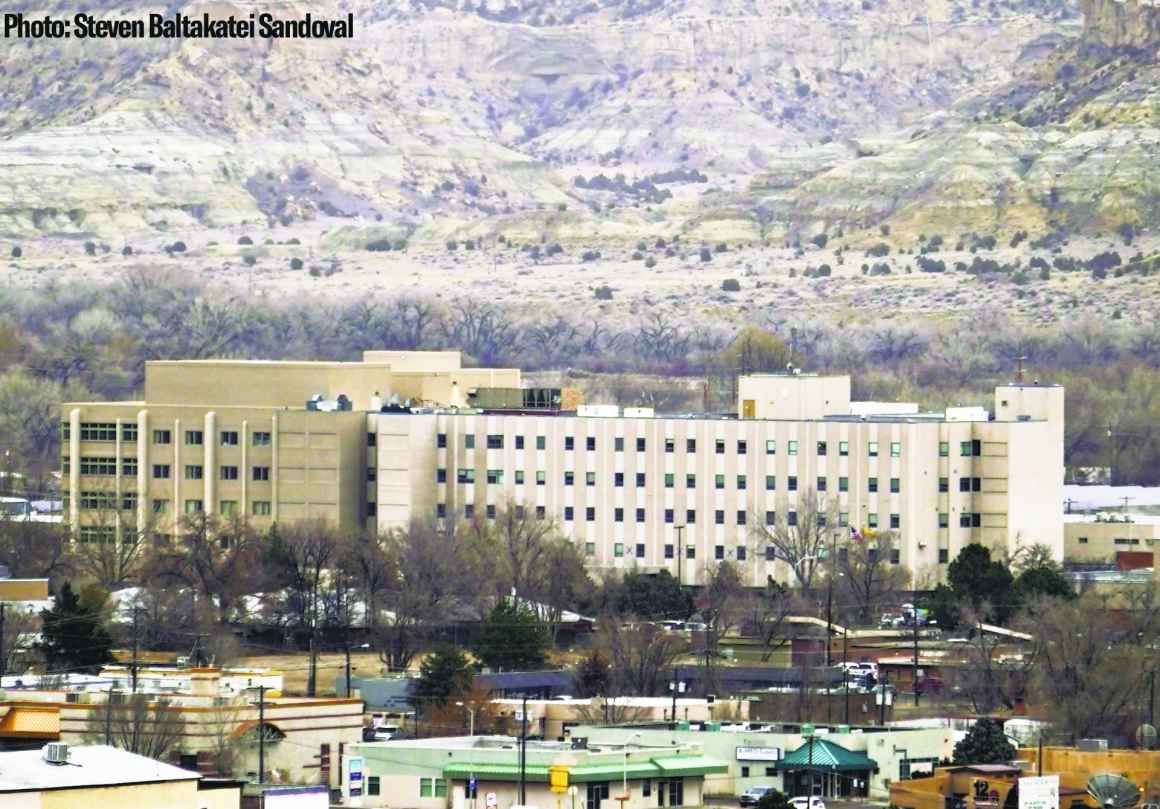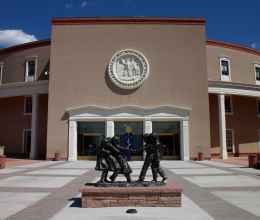
In this interview, Senior Indigenous Justice Staff Attorney Preston Sanchez explains why access to language assistance is vital to the overall health of Indigenous people. The discussion stems from a lawsuit ACLU-NM and the Fine Law Firm filed against San Juan Regional Medical Center (SJRMC) for failing to provide Navajo elder, Larry Williams, with a certified Navajo language interpreter, leading to his misdiagnosis and untimely death in 2018.

Photo left: Larry Williams dancing with his daughter.
According to medical records, SJRMC staff never considered Larry’s language needs nor provided him with a Navajo interpreter. In its failure to communicate adequately with Larry, SJRMC staff failed to observe his altered mental state – a common symptom associated with the onset of sepsis. Instead, they only treated Larry for a simple urinary tract infection and discharged him that afternoon. Larry’s undiagnosed condition continued to worsen. That same evening, his family rushed him back to SJRMC, where staff determined that he was suffering from severe septic shock. He died two days later.
"San Juan Regional Medical Center has a legal duty to provide language assistance to its patients who are limited English proficient; and that means providing them a Navajo interpreter."
Maria Archuleta (MA): Thanks for making the time, Preston. When I talk about this case with people, I get mixed reactions. Many, like me, are outraged. Others ask, “Why couldn’t his daughters, who were with him at the hospital, interpret for him?” or “Did he really not speak English?” Could you talk about Native elders who speak primarily Indigenous languages and why they need interpretation?
Preston Sanchez (PS): New Mexico is home to 23 tribal nations. Among them, seven different Native languages are spoken. In fact, many of our Native elders today grew up in households and communities where those languages were – and still are – the primary languages spoken day-to-day.
In the case of Larry Williams, for example, who was 67 years old at the time of his death, he spoke primarily in Navajo with his family. He was also a union welder for a really long time, working with other Navajo speakers. Throughout his entire life he had been immersed in the Navajo language and culture. Only periodically was he required to consult with doctors in English. However, his wife usually translated for him during those visits – but those visits were never emergency related visits.
His daughters speak some Navajo, but they’re not fluent. More importantly, though, medical terminology is very technical for anyone to understand. It would be extremely difficult for any person who speaks Navajo — or any language other than English — to be a translator between a doctor and patients like Larry who are limited-English proficient. That is why certain legal standards exist that require hospitals to provide language assistance to limited-English patients, like Larry, to ensure adequate communication occurs between medical staff and the patients they serve.
MA: This unfortunate scenario can take so many different forms. My family is from up north and my grandparents spoke primarily Spanish. My paternal grandparents definitely would’ve needed a language interpreter to communicate about their medical needs. There’s no way I could have translated for them. For that matter, with my very imperfect Spanish, I would need one myself if I had a medical emergency in a Spanish speaking country.
His daughters talked about his deep knowledge of the Navajo language and Navajo traditions. People would seek him out for his wisdom. The loss of a traditional elder has a ripple effect across many generations.
PS: Absolutely. Imagine you visit a country where you know only enough of the language to order tacos and a beer and maybe enough to haggle about a blanket at the local market. Maybe you even speak the language enough to have meaningful conversations with strangers. But, if you were to have a medical emergency like Larry’s, where you feel confused, disoriented, unable to walk in a straight line, and unable to breathe – then you might be in trouble at a hospital. No one can comprehend what you’re saying, and you have no one to speak on your behalf. Any one of us would need an interpreter to help us communicate about our medical needs in that situation. We all need to be able to communicate and comprehend pretty complicated medical jargon to survive.
MA: The staff assumed Larry Wiliams spoke English?
PS: The doctor who diagnosed Larry did not think there was any language barrier. He was also not at all familiar with the term Limited-English Proficient and he didn’t know about any SJRMC policy or training requiring language assistance. According to the doctor, about 60% of the patients he serves are Navajo. This all points to a systemic problem at SJRMC and, we suspect, at other hospitals across the state. Medical staff appear to lack any awareness about potential language or cultural barriers.
MA: It’s beyond belief that the doctor could go through a whole treatment of a patient at a high risk of death and never notice that he wasn’t proficient in English. I know his daughters did their best to advocate for him, but could you tell me why we shouldn’t expect family and friends to interpret in situations like these?

Photo above: San Juan County Regional Medical Center in Farmington
PS: Even if Larry Williams’ daughters spoke perfect Navajo, it takes certified training to be able to convert medical terms from English to Navajo and vice-versa. Not every medical term can even be translated into Navajo because the words in Navajo just don’t exist. Most of us don’t understand much medical terminology, and it’s not easy to understand what’s going on even when you are completely fluent in English. The same is true for legal matters. I can speak just a little bit of Navajo – enough to communicate with Navajo speakers about the weather -- but would I be able to speak to clients about complex legal issues in Navajo. F** no. If I had a client who primarily speaks Navajo, he or she would obviously need a Navajo interpreter who specializes in legal matters. It would be unethical for me to assume that a limited English proficient client would understand me – and vice versa.
"We want New Mexico hospitals to know that they need to provide their Indigenous patients with adequate language assistance and that they’ll be held accountable if not."
Larry’s wife Lenora is fluent in Navajo and was usually with him at appointments, but she couldn’t miss her own dialysis appointment that day. But even if Lenora had been there, she shouldn’t have had to bear the burden of acting as a medical interpreter. Not to mention, SJRMC has a legal duty to provide language assistance to its patients who are limited English proficient; and that means providing them a Navajo interpreter.
MA: This tragic and senseless death shows the importance of how much education needs to happen about the needs of the diverse cultures in New Mexico.
PS: Absolutely, people’s lives depend on it.
It’s also important to remember that Larry’s death was not only a terrible loss to his family but to his entire community. His daughters talked about his deep knowledge of the Navajo language and Navajo traditions. People would seek him out for his wisdom. The loss of a traditional elder has a ripple effect across many generations. So, this situation is extremely unfortunate.
MA: One last question. What are you hoping to achieve with this case?
PS: We want New Mexico hospitals to know that they need to provide their Indigenous patients with adequate language assistance and that they’ll be held accountable if not. Language assistance is vital to the overall health of our Indigenous People.
MA: Thanks for talking to me.
PS: Anytime, Maria.



